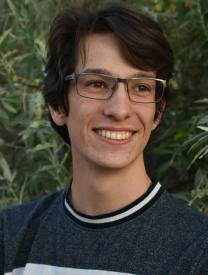Hometown
Albuquerque, New Mexico
Degrees
Bachelor of Arts in Chemistry
Bachelor of Science in Engineering in Materials Science and Engineering
Post-Penn Plans
PhD in Materials Science and Engineering at CU Boulder
Penn Experiences
I enjoyed the academic communities I was in at Penn. I got involved as the President of the Materials Science and Engineering Society and as the President and co-founder of the VIPER Student Board. I like going on long walks, regularly passing through the various parks and green areas around Penn's campus. My favorite memories are those with my friends: getting dinner, playing music, exploring the outdoors, and other moments.
Research Interests
During my freshman year at Penn, I started working with Christopher B. Murray in Chemistry and MSE on projects involving biomass conversion and photocatalysis using nanocrystalline catalysts. I found these projects exciting and deeply fulfilling because they demonstrated to me how novel chemistry and materials science can be applied to solve grand energy challenges. I presented some of this work at the 2018 Undergraduate Research Symposium in the Chemical and Biological Sciences at the University of Maryland, Baltimore County, winning second place in the category of Chemical Sciences. After my sophomore year, I traveled back to the southwest, engaging in a Science Undergraduate Laboratory Internship (SULI) at the National Renewable Energy Laboratory (NREL) in Golden, Colorado. At NREL, I worked with Lin Simpson and Chaiwat Engtrakul to develop a vapor-phase process for turning powdery glass microbubbles into blocks of foam for use as a highly-insulating material. I also attended numerous talks which broadened my understanding of energy research and made me appreciate the monumental progress of solar and wind energy in the past few decades. Above all, I was exposed to the idea of "electrons to molecules," which describes a future where electricity from renewable sources is so abundant that it can be used for the industrial production of chemicals and fuels. I quickly became infatuated with electrochemical processes and last semester, I launched a collaboration project between the Murray and Mallouk Groups to synthesize and test cobalt phosphide nanocrystals for their utility as catalysts in the hydrogen evolution reaction. In the coming semesters and beyond, I hope to continue synthesizing novel materials to realize the full potential of renewable energy.
Why did you choose VIPER?
I wanted to study both Chemistry and MSE. I have also been interested in energy research going back to science fair projects in middle school. VIPER offered everything I wanted. Naturally, I went with it.
What are three words you would use to describe VIPER?
Synergy, ambition, power
What is your favorite aspect about the program?
Simultaneously taking chemistry and materials science classes is definitely a challenge but also a great opportunity. Nearly every day, I get to see where these two fields intersect and mingle. Observing, understanding, and wondering about these interactions is my favorite part of the program
How do you see VIPER integrating into your future goals?
As a researcher in a national lab or in academia, I want to design and make materials that solve energy problems. My coursework and research through VIPER have given me the synthesis skills and fundamental understanding necessary for accomplishing those goals.
How do you like to spend your free time? Are you involved in any organizations in or out of Penn?
I enjoy playing video games, spending time in nature, and doing spontaneous digital creative projects in the form of 3D-printing, graphic design, and even a Minecraft build featured in Business Insider. I am the President of the Penn MSE Society and hope to start similar clubs for chemistry and VIPER students. I also like volunteering for numerous science outreach programs at Penn.
What advice would you give to incoming VIPER students?
Spend time wandering. Time spent wandering, whether it be on campus, on Wikipedia, or anywhere else, is not time lost and I have learned a lot from it.

